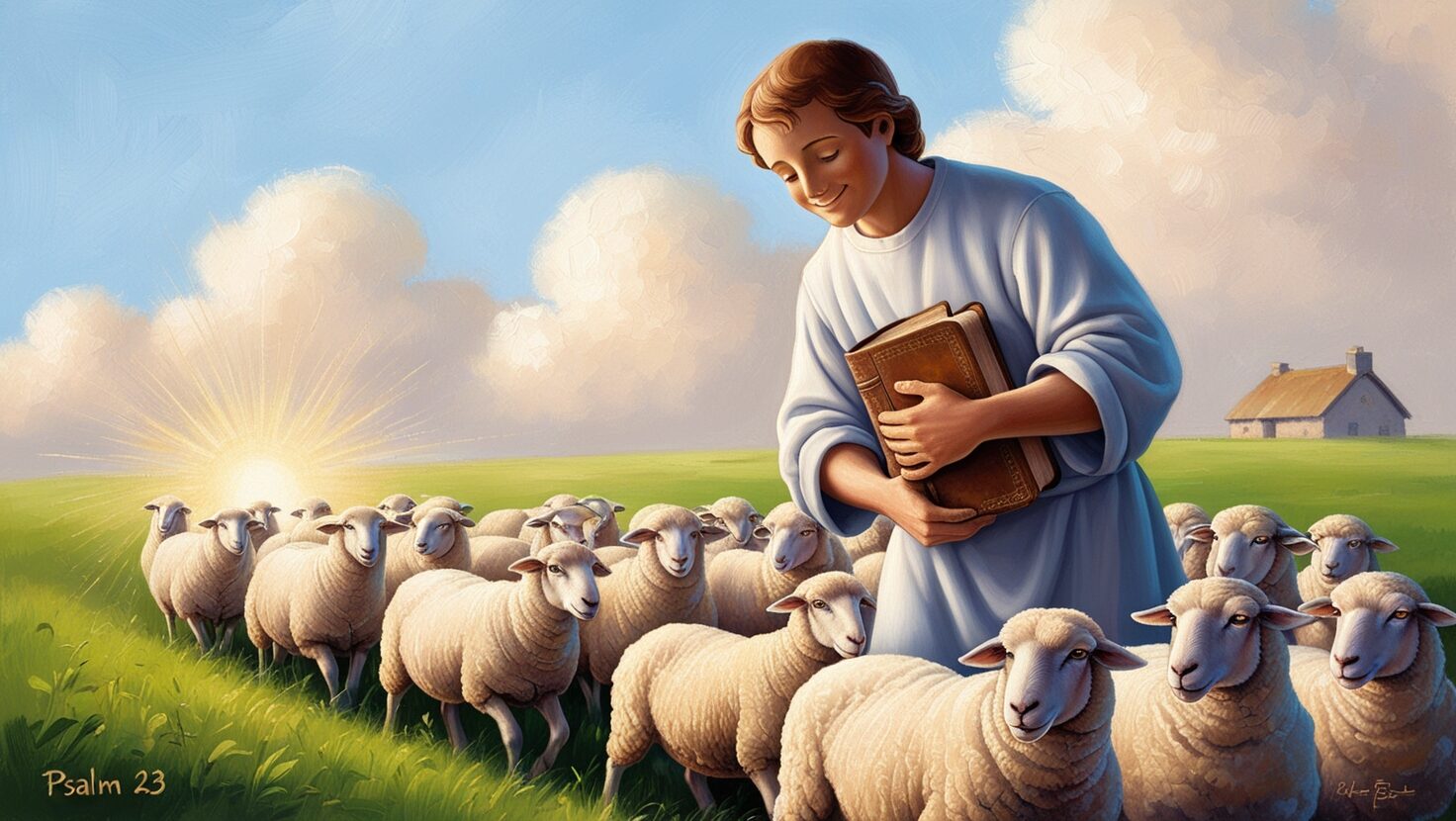Psalm 23 is a timeless masterpiece of Scripture, a poetic expression of trust, comfort, and hope in the Lord’s care. Written by King David, this psalm has resonated with believers across centuries, offering solace in times of despair and guidance in moments of uncertainty. Through the metaphor of a shepherd and his sheep, David paints a vivid picture of God’s intimate relationship with His people—a relationship marked by provision, protection, and presence. Let us delve deeper into this beloved psalm to uncover its profound truths and its relevance to our lives today.
Psalm 23 King James Version
The Lord is my shepherd; I shall not want.
2 He maketh me to lie down in green pastures: he leadeth me beside the still waters.
3 He restoreth my soul: he leadeth me in the paths of righteousness for his name’s sake.
4 Yea, though I walk through the valley of the shadow of death, I will fear no evil: for thou art with me; thy rod and thy staff they comfort me.
5 Thou preparest a table before me in the presence of mine enemies: thou anointest my head with oil; my cup runneth over.
6 Surely goodness and mercy shall follow me all the days of my life: and I will dwell in the house of the Lord for ever.
The Lord as Our Shepherd: A Personal Declaration
The psalm begins with the powerful affirmation: “The Lord is my shepherd; I shall not want” (Psalm 23:1). This opening line is deeply personal. David doesn’t merely say that the Lord is a shepherd or even our shepherd; he declares, “The Lord is my shepherd.” This intimate claim reflects a relationship built on trust and dependency.
David’s choice of imagery is significant. As a former shepherd himself, he understood the responsibilities of a shepherd—feeding, guiding, protecting, and nurturing the flock. Sheep are utterly dependent on their shepherd for survival; they cannot fend for themselves. In the same way, we are entirely reliant on God for our spiritual sustenance and safety.
In our modern world, where independence is often celebrated, it can be challenging to embrace such dependency. Yet this verse invites us to surrender our self-reliance and rest in the sufficiency of God. To say “I shall not want” is to declare that with God as our Shepherd, we lack nothing essential for life and godliness.
Green Pastures and Still Waters: The Gift of Rest
David continues: “He makes me lie down in green pastures. He leads me beside still waters” (Psalm 23:2). These words evoke images of peace and abundance. For sheep, green pastures signify nourishment, while still waters symbolize refreshment. But notice that the Shepherd doesn’t merely suggest rest—He makes His sheep lie down.
In our fast-paced lives, rest often feels like a luxury rather than a necessity. We push ourselves to exhaustion, striving to meet endless demands. Yet God calls us to pause and find rest in Him. The green pastures represent His Word—a source of spiritual nourishment—and the still waters reflect His calming presence that restores our weary souls.
This verse challenges us to ask: Are we allowing God to lead us to places of rest? Or are we resisting His guidance, too caught up in our busyness to hear His voice? True rest comes when we trust the Shepherd to provide for our needs.
Walking Through Valleys: Courage in Darkness
Verse 4 brings a shift in tone: “Even though I walk through the valley of the shadow of death, I will fear no evil, for you are with me; your rod and your staff, they comfort me.” Life is not without its valleys—those dark seasons marked by loss, fear, or uncertainty. Yet David’s confidence remains unshaken because he knows he is not alone.
The “valley of the shadow of death” does not necessarily refer to physical death but encompasses any situation where danger or despair looms large. The imagery here is striking; shadows can appear menacing but lack substance. Similarly, the threats we face often lose their power when viewed through the lens of faith.
The Shepherd’s “rod” and “staff” symbolize His protection and guidance. The rod wards off predators, while the staff gently steers sheep back onto safe paths. In moments when life feels overwhelming, these tools remind us that God’s discipline and direction are acts of love meant to keep us close to Him.
A Table Prepared: Abundance Amid Adversity
David shifts from pastoral imagery to a banquet scene in verse 5: “You prepare a table before me in the presence of my enemies; you anoint my head with oil; my cup overflows.” This verse speaks of honour and abundance even in the face of opposition.
The prepared table signifies God’s provision and fellowship—a place where His children are welcomed and celebrated. The anointing with oil reflects consecration and blessing, while the overflowing cup symbolizes abundance beyond measure.
It’s important to note that this scene unfolds “in the presence of my enemies.” God doesn’t always remove our challenges but blesses us amid them. This verse encourages us to trust that His goodness will prevail regardless of our circumstances.
Goodness and Mercy: A Promise for Eternity
The psalm concludes with a declaration of hope: “Surely goodness and mercy shall follow me all the days of my life, and I shall dwell in the house of the Lord forever” (Psalm 23:6). David envisions a future filled with God’s unwavering love (hesed, or covenant faithfulness) and eternal fellowship with Him.
To say that goodness and mercy “follow” us is an understatement; in Hebrew, it implies pursuit. God’s love actively seeks us out every day of our lives. And this promise extends beyond this life into eternity—we are assured a place in His presence forever.
This final verse invites us to live with confidence and gratitude. No matter what trials we face today, we can rest in the assurance that God’s goodness will never waver.
Living Psalm 23 Today
Psalm 23 is more than poetic comfort; it offers practical wisdom for navigating life with faith:
- Trust God Completely: Like sheep trusting their shepherd, we must rely on God for guidance and provision.
- Embrace Rest: Prioritize time for spiritual renewal through prayer, Scripture reading, or simply being still before Him.
- Find Courage: Remember that even in life’s darkest valleys, God walks beside you.
- Celebrate Abundance: Recognize His blessings even amid challenges.
- Live with Hope: Anchor your heart in His promise of eternal fellowship.
Conclusion
Psalm 23 invites us into a profound relationship with God—a relationship characterized by trust, rest, courage, gratitude, and hope. As you reflect on this psalm today, let its truths reshape your perspective on life’s challenges and joys. Remember that no matter where you are on your spiritual journey, you have a Shepherd who loves you deeply and leads you faithfully toward green pastures and still waters.
May we all learn to say with confidence: “The Lord is my shepherd; I shall not want.”



